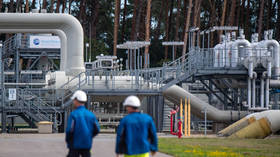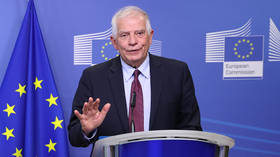EU member reveals bloc's new anti-Russia sanctions

The recently announced, ninth package of sanctions on Russia by Brussels will not involve any fresh restrictions against the country's energy sector, Hungarian Foreign Minister Peter Szijjarto told journalists in Brussels, following a meeting of the bloc’s top diplomats.
Any such restrictions would threaten Budapest’s interests, the minister said, adding that such risks have been avoided. “It was important to us that the security of the energy supply could not be compromised in any way by the package,” he said, adding that “this was achieved.”
Neither fossil fuels nor nuclear energy will be affected by any of the restrictions, according to Szijjarto. However, the minister also criticized the very fact that the discussion in Brussels was still focused on sanctions rather than on communicating with Moscow.
“It is a big problem that the discussions are moving towards sanctions,” Szijjarto said, calling this approach a “failure” because it does “not lead towards peace.” The issue of peace is thus pushed to the background while the rhetoric of war dominates the discussion, the minister added.
Earlier on Monday, the EU’s top diplomat, Josep Borrell, told journalists that there was still no agreement on the ninth batch of anti-Russia sanctions ahead of the ministerial meeting. According to European Commission President Ursula von der Leyen, the bloc plans to add some 200 entities to its blacklist and target the Russian minerals extraction sector next.
Hungarian media outlets reported on Monday that a total of 141 private individuals and 47 organizations will be added to the EU blacklist. Budapest also insisted on removing some people from the list, arguing it would impede open international communication, as well as prevent negotiations necessary to end the ongoing conflict between Moscow and Kiev.
Western nations have imposed several rounds of sanctions against Moscow since the start of Russia’s military offensive in Ukraine in late February. The restrictions involved freezing half its gold and foreign currency reserves and targeting its energy exports, including an oil price cap. The sanctions have caused the cost of living and energy prices to surge, however, prompting numerous protest rallies across Europe.













